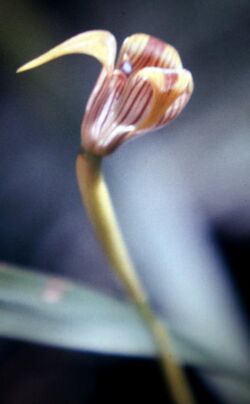Biology:Trigonidium acuminatum
| Trigonidium acuminatum | |
|---|---|

| |
| Trigonidium acuminatum flower | |
| Scientific classification | |
| Kingdom: | Plantae |
| Clade: | Tracheophytes |
| Clade: | Angiosperms |
| Clade: | Monocots |
| Order: | Asparagales |
| Family: | Orchidaceae |
| Subfamily: | Epidendroideae |
| Genus: | Trigonidium |
| Species: | T. acuminatum
|
| Binomial name | |
| Trigonidium acuminatum Lindl.
| |
Trigonidium acuminatum is an orchid found from Colombia to Bolivia and from Suriname to Venezuela.
Taxonomy
The specific epithet acuminatum is derived from the acuminate shape of the sepals as compared to other species.[1]
Description
Trigonidium acuminatum is 15–18 cm (5.9–7.1 in) tall with fluted pseudobulbs and a narrow leaf that curves over at the tip. The flowering stem is slightly taller than the leaves, bearing a striped yellow-brown flower 1.7 cm (0.67 in) wide. The long sepals form a tubular flower that opens at the end. The reddish eyespots of the small petals are located within the tube. These eyespots attract male bees to perform pseudocopulation with the orchid's blossom. The petals are ovoid and taper at the tip, and are similar in hue to the sepals. The lip and column are hidden within the tube.[2]
References
- ↑ G. B. Knowles and Frederic Westcott (1838). The Floral Cabinet. 2. Bradbury and Evans. p. 143.
- ↑ Rebecca Tyson Northen (1996). Miniature Orchids and How to Grow Them (illustrated, reprint ed.). Courier Corporation. p. 173. ISBN 9780486289205.
Wikidata ☰ Q15472593 entry

